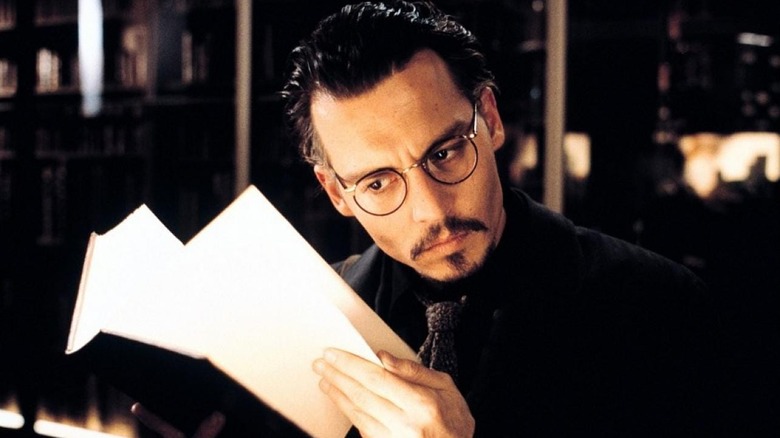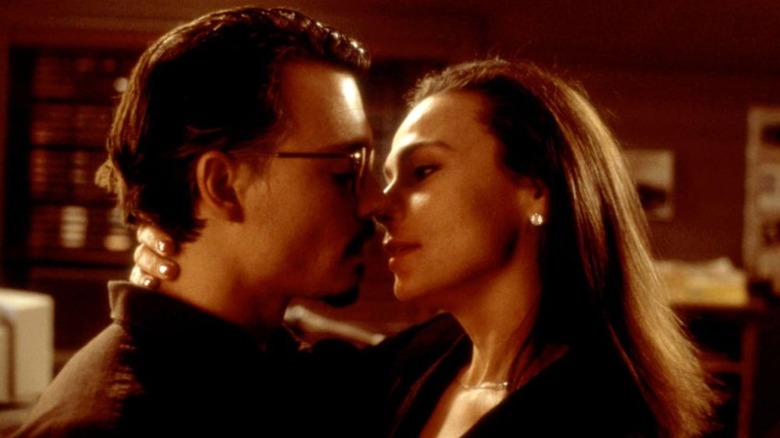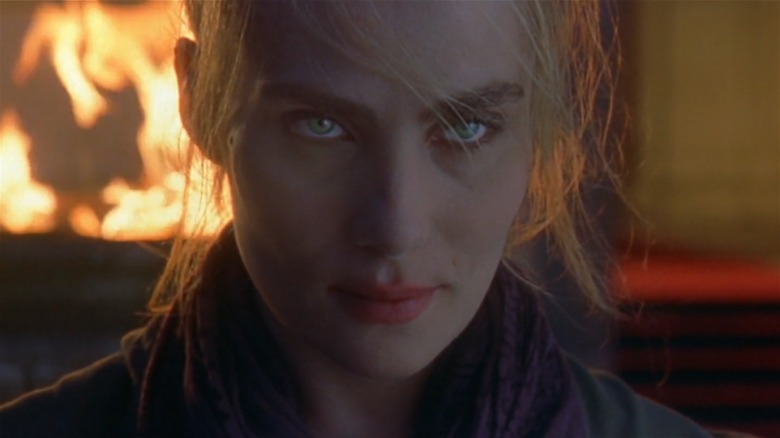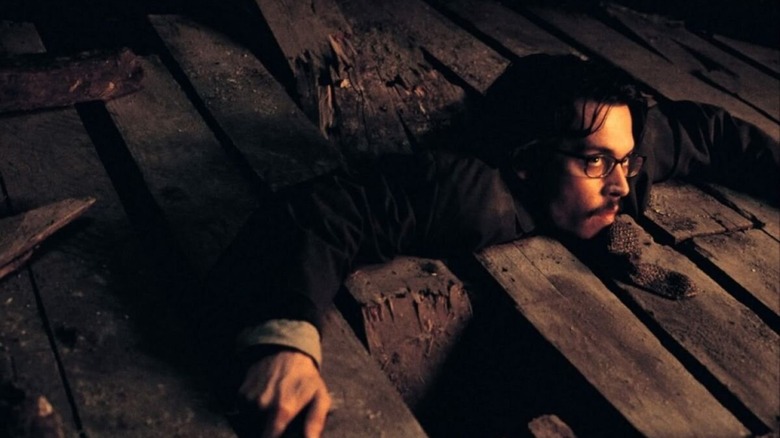The Ninth Gate Ending Explained: Even Hell Has Its Heroes
Arturo Pérez-Reverte's supernatural mystery novel, "The Club Dumas," makes for an intriguing, labyrinthine read. Set in a universe where antiquarian booksellers are aplenty (and thriving, due to a steady interest in and demand for rare, precious tomes), the novel follows Lucas Corso, who is hired to authenticate a manuscript by Alexandre Dumas. Corso is soon led down an increasingly dangerous, absurd path that causes him to flit around the world in search of an elusive truth lost to humanity, specifically, the gates to hell.
Roman Polanski's take on Pérez-Reverte's work culminates in the atmospherically tense "The Ninth Gate," which follows the basic beats of the novel except for its open-ended conclusion. "The Club Dumas" also ends on an interpretative note, but the novel's merit lies in reinforcing its literary-heavy references in a meaningful manner, while the film takes a more loose stance in deepening its convoluted mythos. Almost nothing is explained for clarity, as the film assumes that its religio-mythical metaphors speak for themselves. And in the process, it posits a wild-goose-chase mystery that is heady and obtuse in its unraveling.
What "The Ninth Gate" exceeds in, however, is creating an atmosphere of palpable dread and intrigue — shadowy forces seem to be pulling Dean Corso's (Johnny Depp) strings throughout, as he encounters unscrupulous antique collectors and satanic cults willing to go to any lengths to retrieve something lost to the natural world for good reason.
What you need to remember about the plot of The Ninth Gate
Corso is a man without a set moral compass, eager to take on investigations that promise profits, despite the risks involved. "There's nothing more reliable than a man whose loyalty can be bought for hard cash," says collector Boris Balkan (Frank Langella) about Corso, when he hires him to authenticate three copies of a rare book. The book in question: Aristide Torchia's "The Nine Gates of the Kingdom of Shadows," which presumably contains a ritual for summoning the Devil, written in collaboration with Lucifer himself. Only interested in hard facts and hard cash, Corso takes on the job of figuring out which copy is the real one, which opens Pandora's box of conspiracies, shadowy secrets, and hidden truths that prove a bit too much for the antique book dealer to handle.
Apart from being followed by various parties, Corso is shadowed by a mysterious woman, only referred to as "The Girl" (Emmanuelle Seigner), who talks to Corso in cryptic ways, while nudging him in the right direction. During his travels across the globe in search of the authentic copy of the book, Corso makes a startling discovery: all three copies look identical, but differ in terms of the signatures of the artists beneath the engravings, which turn out to be significantly different on closer inspection. While some are signed A.T. (Torchia, the writer), others are signed L.C.F., which seems to be short for Lucifer, adding legitimacy to the claims that Torchia wrote it with the help of the Devil himself. This begs the question: which copy is authentic?
The answer is tricky, as there is no authentic copy at all because the ritual can only be completed when all 9 L.C.F engravings are combined together for the purpose.
What is the Ninth Gate?
Polanski's film remains deliberately obtuse about the true nature of the Ninth Gate itself, to the point that it feels more like a confusing MacGuffin as opposed to a concrete end goal that Corso edges towards. The book dealer's dedication to the investigation, along with his willingness to flirt with danger even when people drop dead, can only be attributed to his self-serving needs as opposed to a scholarly passion for truth. We know that the Gate is a conduit to Hell, as the ritual summons Lucifer, but there's barely any substance to why Balkan covets this in the first place, apart from vague declarations of achieving immortality.
Sure, the film teases themes of greed and obsession fueled by a need to achieve power at all costs, better understood via a specific religious lens that only the ultra-affluent can afford to don, but the ending undermines these wispy threads that need to be pored over/scrutinized like Corso attempting to authenticate the ancient tomes. The Girl, who appears whenever Corso needs help, is clearly established as the embodiment of Lucifer while being visually represented as the Whore of Babylon in the engravings, and it is she who is the key to the mind-bending mystery that Corso finds himself surrounded with. In many ways, she is The Ninth Gate, as the act of Corso having sex with her outside of the burning castle in the end is what earns him entry into Hell — an event already prophesied in the final engraving that allows Corso to complete the ritual.
It is possible that "The Ninth Gate" inverses traditional interpretations of Hell by positing it as a gateway to enlightenment, as the film ends with Corso entering the gates, which shine bright like the advent of a new dawn.
What the ending of The Ninth Gate means
The baffling ending works best when interpreted on a purely thematic and psychological level, where it tells the story of a man driven by self-interest, but not power, being deemed worthy of an esoteric truth hidden from humanity. Whether this truth comes with devastating moral consequences demands a measured look into the religious references that Polanski ingrains into the film's fabric, but Corso's fate at the end underlines the fact that he was meant to complete the ritual all along. While Balkan's obsession drove him to extremes, he failed to complete the ritual, thanks to inordinate hubris and general idiocy, as he was unable to tell a genuine engraving apart from a false one, despite being a collector.
Interestingly, the novel posits a more nuanced conclusion, where Corso muses that every individual will "get the devil they deserve," which shifts the significance of The Ninth Gate from a literal to a deeply psychological one. Here, books are used as a means to covet more power, status, and legitimacy in society, and the cost of such hubris masked as "knowledge" is an end that's swift and brutal, much like that of Balkan in the film. This makes Depp's Corso an unconventional hero figure who adheres to unspoken rules to be deserving of a pact, which might or might not be Faustian in nature.
By the end of "The Ninth Gate," Corso is a changed man, as he keeps pursuing the truth despite being offered a sizeable amount to leave the matter alone. Perhaps this split-second decision is what guarantees his place among the esoteric, as a man worthy of a bargain that is too all-consuming to be surmised into words. After all, even Hell has its heroes.



